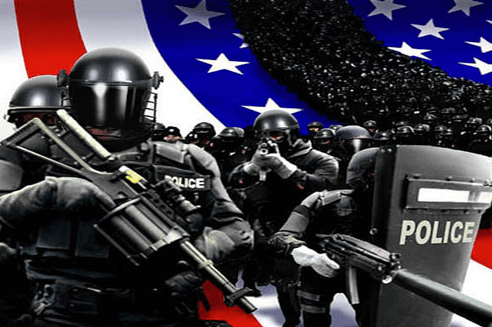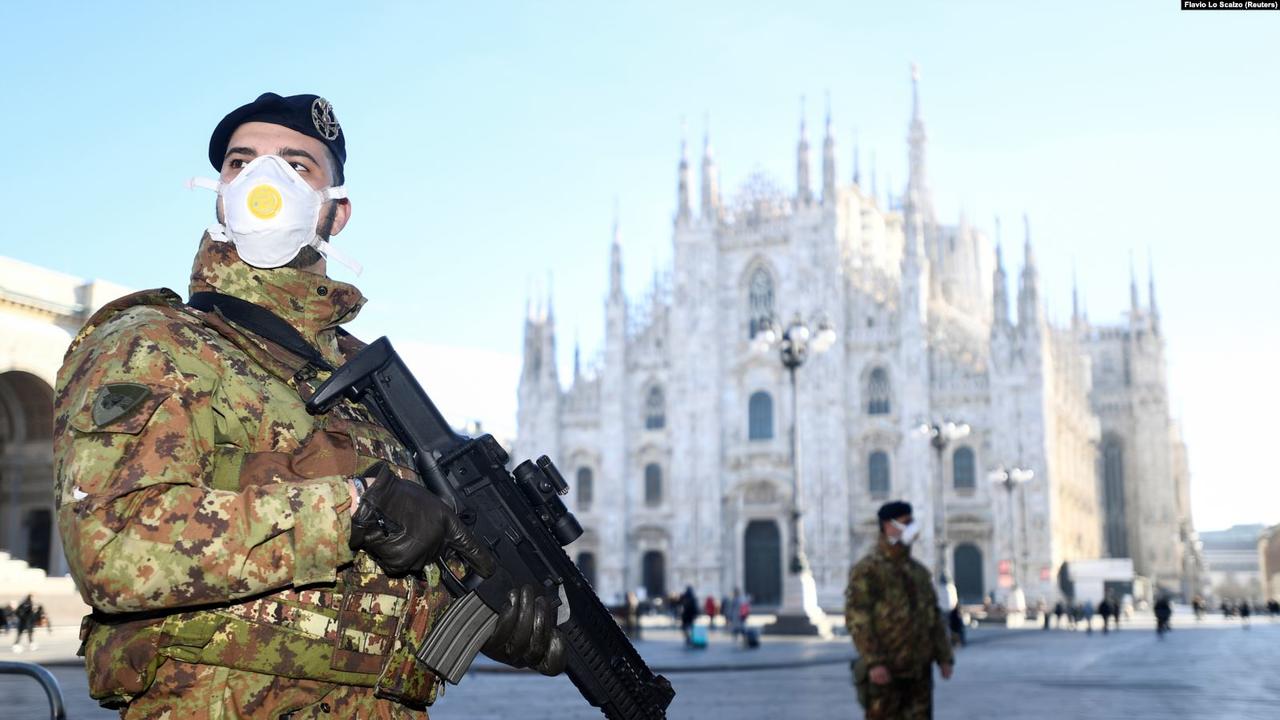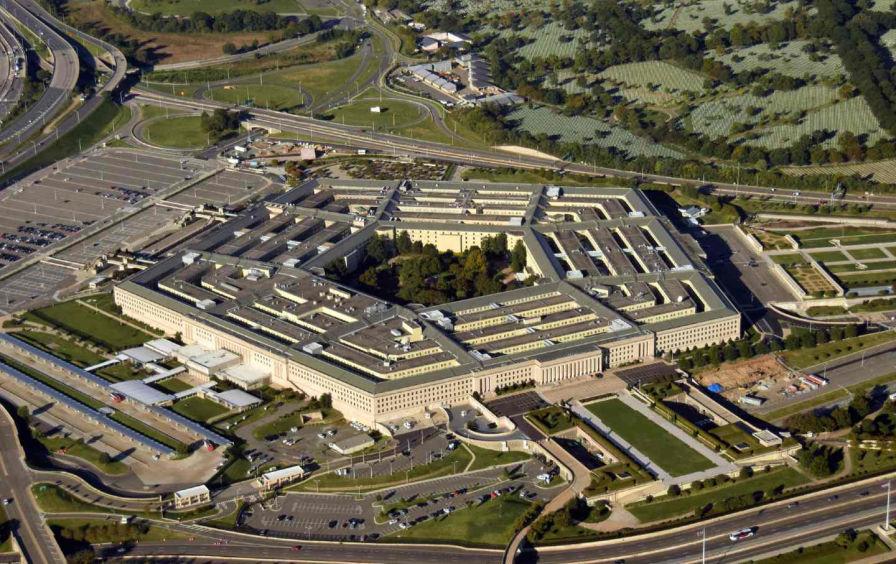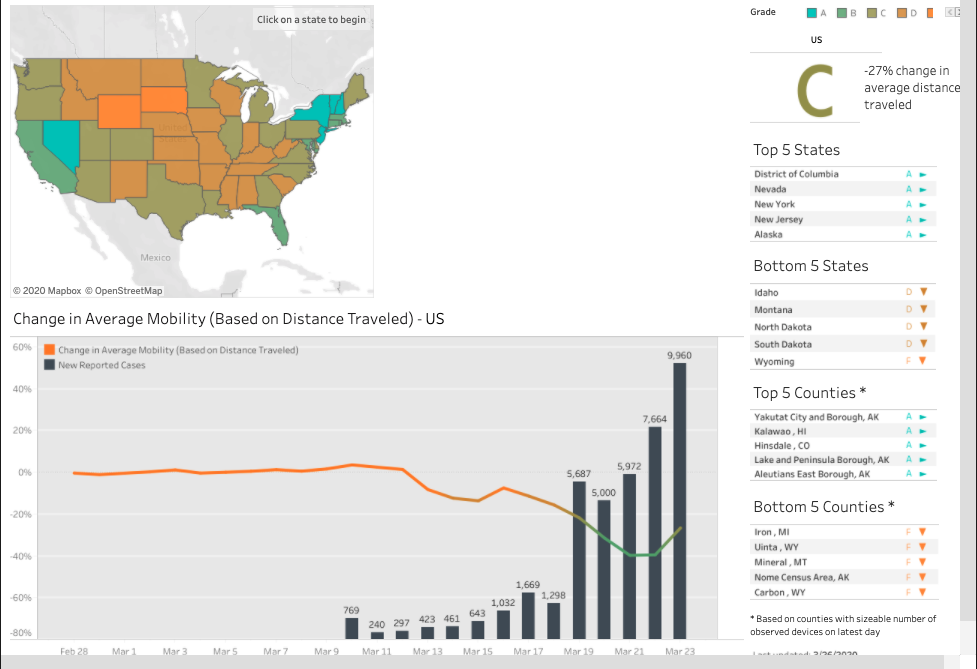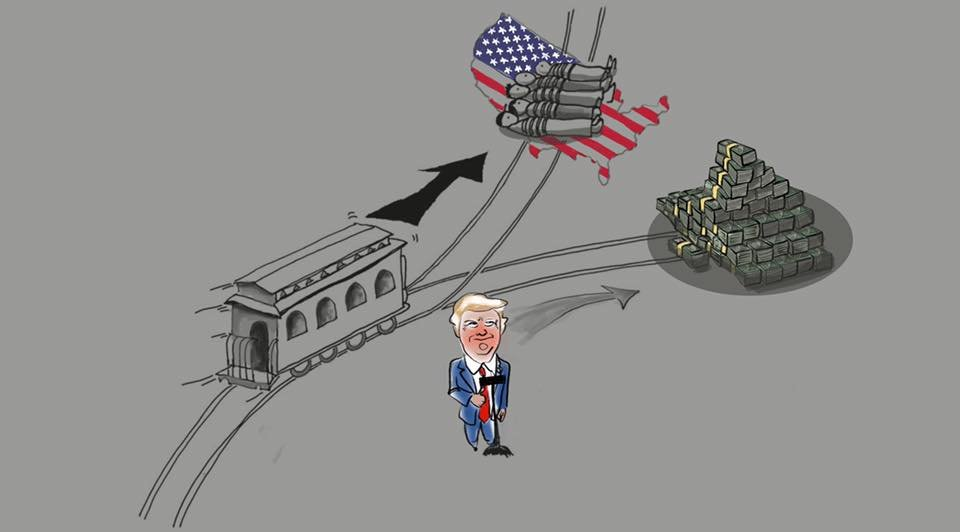COVID-19 – The European Union Unravels
Authored by Soeren Kern via The Gatestone Institute,
As the coronavirus pandemic rages through Europe — where more than 250,000 people have now been diagnosed with Coronavirus Disease 2019 (COVID-19) and 15,000 have died — the foundational pillars of the European Union are crumbling one by one.
Faced with an existential threat, EU member states, far from joining together to confront the pandemic as a unified bloc, instinctively are returning to pursuing the national interest. After years of criticizing U.S. President Donald J. Trump for pushing an “America First” policy, European leaders are reverting to the very nationalism they have publicly claimed to despise.
Ever since the threat posed by coronavirus came into focus, Europeans have displayed precious little of the high-minded multilateral solidarity that for decades has been sold to the rest of the world as a bedrock of European unity. The EU’s unique brand of soft power, said to be a model for a post-national world order, has been shown to be an empty fiction.
In recent weeks, EU member states have closed their borders, banned exports of critical supplies and withheld humanitarian aid. The European Central Bank, the guarantor of the European single currency, has treated with unparalleled disdain the eurozone’s third-largest economy, Italy, in its singular hour of need. The member states worst affected by the pandemic — Italy and Spain — have been left by the other member states to fend for themselves.
The seeds of the European Union were planted in the ashes of the Second World War. In May 1949, Robert Schuman, one of the EU’s founding fathers, boldly announced the creation of new world system:
“We are carrying out a great experiment, the fulfillment of the same recurrent dream that for ten centuries has revisited the peoples of Europe: creating between them an organization putting an end to war and guaranteeing an eternal peace.”
The European Union, seven decades in the making, is now unravelling in real time — in weeks. After the dust of the coronavirus pandemic settles, the EU’s institutions will almost certainly continue to operate as before. Too much political and economic capital has been invested in the European project for European elites to do otherwise. However, the EU’s attraction as a post-national model for its own citizens, much less for the rest of the world, will have passed.
Recent examples of the unilateral pursuit of the national interest by European leaders, many of whom publicly espouse globalism but in times of desperation embrace nationalism, include:
-
France. On March 3, France confiscated all protective masks made in the country. “We will distribute them to healthcare professionals and to French people affected by the coronavirus,” French President Emmanuel Macron wrote on Twitter. On March 6, the French government forced Valmy SAS, a face mask manufacturer near Lyon, to cancel an order for millions of masks placed by the UK’s National Health Service.
-
Germany, March 4. Germany banned the export of medical protective equipment such as safety glasses, respiratory masks, protective coats, protective suits and gloves. On March 7, the Swiss newspaper Neue Zürcher Zeitung reported that German customs authorities were preventing a Swiss truck carrying 240,000 protective masks from returning to Switzerland, which is not a member of the EU. The Swiss government summoned the German ambassador to protest against the export ban. “In these contacts, the German authorities were urged immediately to release the blocked products,” a Swiss government spokesperson was quoted as saying. After facing a backlash from other EU member states, Germany on March 19 reversed course and lifted the export ban.
-
Austria, March 10. Austria became the first EU country to close its borders to another EU country. Chancellor Sebastian Kurz announced controls along the border with Italy and a ban on the entry of most travelers from there. “The utmost priority,” Kurz said, “is to prevent the spread and thus importing the illness into our society. There is therefore a ban on entry for people from Italy into Austria, with the exception of people who have a doctor’s note certifying that they are healthy.” The government also announced a ban on all air or rail travel to Italy. Austria’s decision threatened to undo the so-called Schengen Area, which entered into effect in 1995 and abolishes the need for passports and other types of control at the mutual borders of 26 European countries.
-
Slovenia, March 11. The government closed some border crossings with Italy and at those remaining open, had started making health checks to combat the spread of the virus.
-
Czech Republic, March 12. Prime Minister Andrej Babiš closed the country’s borders with Germany and Austria and also banned the entry of foreigners coming from other risky countries. On March 22, the government said that the border restrictions may last for up to two years.
-
Switzerland, March 13. The Swiss government imposed border controls with other European countries. Switzerland, although not a member of the European Union, is part of the Schengen zone.
-
Italy, March 13. European Central Bank President Christine Lagarde dismissed calls by Italy for financial assistance to help it cope with the pandemic. After her comments rattled financial markets, Lagarde said that the ECB was “fully committed to avoid any fragmentation in a difficult moment for the euro area.” Italian President Sergio Mattarella replied that Italy had a right to expect solidarity rather than obstacles from beyond its borders.
-
Denmark, March 14. Prime Minister Mette Frederiksen imposed border controls on all traffic by land, sea and air until at least April 13.
-
Poland, March 15. The government closed the country’s borders to everyone except Polish citizens or people with a Polish residence permit.
-
Germany, March 16. Germany, the largest and most powerful country in the European Union, introduced controls on its borders with Austria, Denmark, France, Luxembourg and Switzerland. The move came after Germany registered 1,000 new cases of COVID-19 in just one day.
-
Hungary, March 16. Prime Minister Viktor Orbán halted all passenger traffic into Hungary would be halted and only Hungarian citizens allowed to enter the country.
-
Spain, March 16. Interior Minister Fernando Grande-Marlaska decreed the establishment of controls at all land borders.
-
Serbia, March 16. President Aleksandar Vučić declared a state of emergency due to coronavirus. He condemned the EU for restricting exports of medical equipment and appealed for help from his “friend and brother,” Chinese leader Xi Jinping. “European solidarity does not exist,” Vučić said. “That was a fairy tale on paper. I have sent a special letter to the only ones who can help, and that is China.” Serbia applied to become a member of the EU in 2009. Accession talks began in January 2014.
-
Czech Republic, March 17. Czech authorities seized 110,000 face masks that China had sent to Italy. On March 23, the Czech Republic delivered the confiscated material to Italy. “There are 110,000 masks on board the bus as a gift to Italy, which is supposed to replace the material that was probably a Chinese gift for Italian compatriots,” said Foreign Ministry spokeswoman Zuzana Stichova.
-
Germany, March 18. Chancellor Angela Merkel, in a rare televised speech, urged all Germans to obey rules aimed at reducing direct social contact and avoiding as many new infections as possible. “It is serious,” she said. “Take it seriously. Since German reunification, actually, since World War Two, there has never been a challenge for our country in which acting in solidarity was so very crucial.” Merkel’s address to the nation was the first time in nearly 15 years in office that she had spoken to the country other than in her annual New Year’s address. She did not mention the European Union or other EU member states.
-
Belgium, March 22. The coronavirus has fueled tensions between Belgium, which is on lockdown, and the Netherlands, which is not. “In the Netherlands, shops are still open and meetings of 100 people are still allowed — these are breeding grounds for the virus,” said Marino Keulen, mayor of the Belgian border town Lanaken. Belgian authorities have set up barricades along the border and are ordering cars with Dutch license plates to turn around and return home. Keulen called the border checks a “signal to The Hague” to “quickly scale-up” its response and align with neighboring countries. “The Dutch government is incompetent and ridiculous in its response to the coronavirus crisis,” said Leopold Lippens, the mayor of Belgian seacoast town Knokke-Heist. “The Netherlands is doing nothing, so we have to protect ourselves.”
-
Spain, March 25. After failing to obtain assistance from the European Union, the Spanish government asked NATO for help in acquiring 1.5 million face masks and 450,000 respirators. NATO lacks this material and is limited to passing the Spanish request on to the remaining 29 allies, many of which are also members of the EU.
-
Poland, March 25. Polish authorities prevented hundreds of thousands of bottles of hand sanitizer from being exported to Norway, which is not a member of the EU. The Norwegian company Norenco manufactures and packages hand sanitizer for the Scandinavian market at a factory it owns in Poland. Norenco’s chief executive, Arne Haukland, said that after he applied for an export license, five men arrived at the factory, and demanded to be shown its stock of hand sanitizer. He said the company then received a letter ordering it to sell any hand sanitizer it had produced to the local city authorities in Lubin at a fixed price, under emergency coronavirus laws passed in Poland at the start of March. The seizure will exacerbate the supply problem faced by Norwegian hospitals.
-
France, March 25. President Emmanuel Macron, in an address to the nation at a military hospital in the eastern city of Mulhouse, which has been especially hard hit by the coronavirus, called for national, as opposed to European, unity: “When we engage in war, we engage fully, we mobilize united. I see in our country factors of division, doubts, all those who want to fracture the country when it is necessary to have only one obsession: to be united to fight against the virus. I call for this unity and this commitment.”
Meanwhile, in Italy, a nationwide survey published on March 18 found that 88% of Italians believe that the EU is not helping their country. Only 4% thought the opposite while 8% did not have an opinion. More than two-thirds (67%) of Italians said that they believe that being part of the European Union is a disadvantage for their country.
In an article titled, “Coronavirus Threatens European Unity,” Bill Wirtz, a political commentator based in Luxembourg, observed:
“As the coronavirus unfolds, Schengen countries are shutting their own borders. Whether or not they do so because they believe that a coordinated European response would be inefficient, or whether they believe that their own voters wouldn’t buy it — at this stage it’s irrelevant. The mere fact that borders have resurfaced in Europe is a failure for the integrity of the Schengen open borders agreement….
“A coordinated EU response to this crisis does not exist, and as the recommendations fall on deaf ears, Brussels is dealing with a crisis of confidence. There is no union-wide crisis response, coordinated testing or research. Worse than that, the EU institutions are bystanders to a war between countries, which are trying to limit exports of medical supplies in order to keep them for themselves. In times of crisis, the true influence and capacity of the EU has shown, and it is very little.
“As it stands, countries are dealing with a crisis of missing hospital beds, medical equipment, and overall resources. If the virus ever happens to lay lower than it does now, and the conclusion is drawn that the European Union was a powerless bystander in the eye of the storm (which it is), then the Schengen Agreement and open borders in Europe could be dealing with a difficult recovery.”
Darren McCaffrey, the political editor of the France-based news channel Euronews, wrote:
“In the past couple of weeks, solidarity has collapsed in the bloc. Countries have started imposing border controls on neighboring EU countries, and even Germany has taken steps to manage the flow of people entering and leaving its territory.
“On Tuesday, a 35-kilometer-long queue formed at the Polish-German border, where hundreds of Europeans — Latvians, Estonians and Lithuanians — were stuck in trucks, cars and buses.
“As the EU must take measures to prevent the spread of the disease, many are worrying about the essence of the European Union and its four freedoms [the free movement of goods, services, capital and people].
“What is the EU if its own citizens can’t move freely? What is the single market if goods can’t cross Europe’s borders without hindrance?”
In an article titled, “Nations First: The EU Struggles for Relevance in the Fight against Coronavirus,” the German newsmagazine Der Spiegel noted:
“As the pandemic takes hold in Europe, the decades-old union is showing its weaknesses. While the EU managed to survive Brexit and the euro crisis, the corona crisis may yet prove to be an insurmountable challenge.
“Instead of trying to come up with joint solutions, the Continent is becoming balkanized and is reverting to national solutions. Instead of helping each other out, EU countries are hoarding face masks like panicked Europeans are hoarding toilet paper. The early decisions made by some EU member states to refrain from exporting medical equipment to Italy — the EU country that has thus far been hit hardest by the pandemic — has even overshadowed the lack of European solidarity displayed by Hungarian Prime Minister Viktor Orbán in the refugee crisis.
“Europeans are even divided on the question as to how to combat the virus. Whereas Germany is eager to prevent as many people as possible from encountering the virus and becoming infected, the Netherlands wants to see as many healthy people as possible fight off COVID-19, thus becoming immune. The signal is clear: When things get serious, every member state still looks out for itself first — even 60 years after the founding of the community.”
Tyler Durden
Sat, 03/28/2020 – 07:00
via ZeroHedge News https://ift.tt/2UGzv57 Tyler Durden





